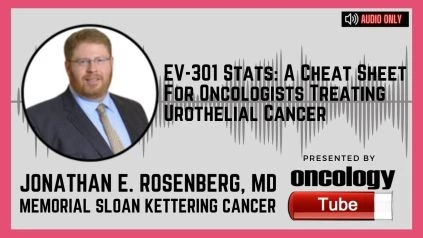Audio: Enfortumab Vedotin was tested in a randomized phase 3 trial in patients with metastatic urothelial cancer who had previously received platinum chemotherapy and an immune checkpoint inhibitor and here we present updated data from the..Read Full Transcript Here
Jonathan E. Rosenberg, MD, Chief, Genitourinary Oncology Service at Memorial Sloan Kettering Cancer Center and Professor of Medicine, Weill Cornell Medical College at Memorial Sloan Kettering Cancer. In this interview, he speaks about the ASCO 2022 Abstract – Long-term outcomes in EV-301: 24-month findings from the phase 3 trial of enfortumab vedotin versus chemotherapy in patients with previously treated advanced urothelial carcinoma.
Synopsis:
The goal of this trial was to compare the overall survival (OS) of people with locally advanced or metastatic urothelial carcinoma who were given enfortumab vedotin (EV) to the OS of those who were given chemotherapy.
This study evaluated the progression-free survival on study therapy (PFS1), overall response rate (ORR), and disease control rate (DCR) of participants treated with EV to persons treated with chemotherapy using the Response Evaluation Criteria in Solid Tumors (RECIST) V1.1.
Furthermore, the duration of response (DOR) of EV and chemotherapy was analyzed using RECIST V1.1, as well as the safety and tolerability of EV, as well as the quality of life (QOL) and Patient Reported Outcomes (PRO) criteria.
Jonathan E. Rosenberg, MD, Chief, Genitourinary Oncology Service at Memorial Sloan Kettering Cancer Center and Professor of Medicine, Weill Cornell Medical College at Memorial Sloan Kettering Cancer. In this audio, he speaks about the ASCO 2022 Abstract – Long-term outcomes in EV-301: 24-month findings from the phase 3 trial of enfortumab vedotin versus chemotherapy in patients with previously treated advanced urothelial carcinoma.
Overview:
The goal of this trial was to compare the overall survival (OS) of participants with locally advanced or metastatic urothelial carcinoma treated with enfortumab vedotin (EV) to the OS of people treated with chemotherapy.
This trial evaluated the progression-free survival on study therapy (PFS1), overall response rate (ORR), and disease control rate (DCR) of persons treated with EV to those treated with chemotherapy.
Furthermore, this study analyzed the duration of response (DOR) of EV and chemotherapy using RECIST V1.1, as well as the safety and tolerability of EV, as well as the quality of life (QOL) and Patient Reported Outcomes (PRO) criteria.

